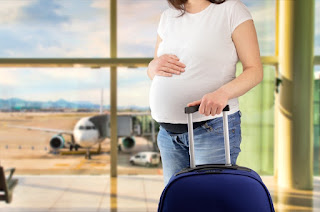Is Air Travel Safe During Pregnancy?
Is it safe to fly during pregnancy? Is it recommended
in the first or last trimester? Although
commercial air travel poses no special risks to a healthy pregnant woman or her
foetus, pregnant women with certain underlying conditions are at increased risk
of problems and should check with their doctors before flying. These conditions
include:
·
Severe anemia
·
Sickle cell disease
·
A history of blood clots
·
Placental insufficiency
The lowered air pressure in a pressurized airplane
cabin has minimal effect on the foetus. During the flight, air pressure is
adjusted to approximately that of between 5,000 and 8,000 feet above sea level.
Although you and your baby will both have less oxygen in your blood than you
would at sea level, your bodies will adjust to this.
Some pregnant women worry about exposure to
electromagnetic radiation from the sun at high altitudes. Although the exposure
increases at higher altitudes, it is still very low and would not increase the
risk of birth defects or miscarriage.
According to the obstetricians and gynecologists, the
safest time for a pregnant woman to travel is during the second trimester (18
through 24 weeks). This is when a pregnant woman has the lowest risk of
miscarriage or premature labor. Many doctors recommend that women avoid flying
after 36 weeks of pregnancy or if they are at risk of preterm delivery. Some
tips for pregnant women who plan to fly:
·
Ask for an aisle seat or a seat at the bulkhead
— which offers the most space and comfort — or over the wings — which offers
the smoothest ride.
·
Fasten the safety belt under your abdomen across
the tops of your thighs.
·
When possible, get up and walk every half-hour
and flex and extend your ankles to prevent blood clots.
·
Drink plenty of fluids. Low humidity in the
cabin has a dehydrating effect.


Comments
Post a Comment